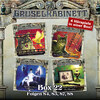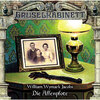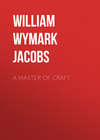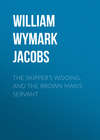Kitabı oku: «Deep Waters, the Entire Collection»
SHAREHOLDERS
Sailor man—said the night-watchman, musingly—a sailorman is like a fish he is safest when ‘e is at sea. When a fish comes ashore it is in for trouble, and so is sailorman. One poor chap I knew ‘ardly ever came ashore without getting married; and he was found out there was no less than six wimmen in the court all taking away ‘is character at once. And when he spoke up Solomon the magistrate pretty near bit ‘is ‘ead off.
Then look at the trouble they get in with their money! They come ashore from a long trip, smelling of it a’most, and they go from port to port like a lord. Everybody has got their eye on that money—everybody except the sailorman, that is—and afore he knows wot’s ‘appened, and who ‘as got it, he’s looking for a ship agin. When he ain’t robbed of ‘is money, he wastes it; and when ‘e don’t do either, he loses it.
I knew one chap who hid ‘is money. He’d been away ten months, and, knowing ‘ow easy money goes, ‘e made up sixteen pounds in a nice little parcel and hid it where nobody could find it. That’s wot he said, and p’r’aps ‘e was right. All I know is, he never found it. I did the same thing myself once with a couple o’ quid I ran acrost unexpected, on’y, unfortunately for me, I hid it the day afore my missus started ‘er spring-cleaning.
One o’ the worst men I ever knew for getting into trouble when he came ashore was old Sam Small. If he couldn’t find it by ‘imself, Ginger Dick and Peter Russet would help ‘im look for it. Generally speaking they found it without straining their eyesight.
I remember one time they was home, arter being away pretty near a year, and when they was paid off they felt like walking gold-mines. They went about smiling all over with good-temper and ‘appiness, and for the first three days they was like brothers. That didn’t last, of course, and on the fourth day Sam Small, arter saying wot ‘e would do to Ginger and Peter if it wasn’t for the police, went off by ‘imself.
His temper passed off arter a time, and ‘e began to look cheerful agin. It was a lovely morning, and, having nothing to do and plenty in ‘is pocket to do it with, he went along like a schoolboy with a ‘arf holiday. He went as far as Stratford on the top of a tram for a mouthful o’ fresh air, and came back to his favourite coffee-shop with a fine appetite for dinner. There was a very nice gentlemanly chap sitting opposite ‘im, and the way he begged Sam’s pardon for splashing gravy over ‘im made Sam take a liking to him at once. Nicely dressed he was, with a gold pin in ‘is tie, and a fine gold watch-chain acrost his weskit; and Sam could see he ‘ad been brought up well by the way he used ‘is knife and fork. He kept looking at Sam in a thoughtful kind o’ way, and at last he said wot a beautiful morning it was, and wot a fine day it must be in the country. In a little while they began to talk like a couple of old friends, and he told Sam all about ‘is father, wot was a clergyman in the country, and Sam talked about a father of his as was living private on three ‘undred a year.
“Ah, money’s a useful thing,” ses the man.
“It ain’t everything,” ses Sam. “It won’t give you ‘appiness. I’ve run through a lot in my time, so I ought to know.”
“I expect you’ve got a bit left, though,” ses the man, with a wink.
Sam laughed and smacked ‘is pocket. “I’ve got a trifle to go on with,” he ses, winking back. “I never feel comfortable without a pound or two in my pocket.”
“You look as though you’re just back from a vy’ge,” ses the man, looking at ‘im very hard.
“I am,” ses Sam, nodding. “Just back arter ten months, and I’m going to spend a bit o’ money afore I sign on agin, I can tell you.”
“That’s wot it was given to us for,” ses the man, nodding at him.
They both got up to go at the same time and walked out into the street together, and, when Sam asked ‘im whether he might have the pleasure of standing ‘im a drink, he said he might. He talked about the different kinds of drink as they walked along till Sam, wot was looking for a high- class pub, got such a raging thirst on ‘im he hardly knew wot to do with ‘imself. He passed several pubs, and walked on as fast as he could to the Three Widders.
“Do you want to go in there partikler?” ses the man, stopping at the door.
“No,” ses Sam, staring.
“‘Cos I know a place where they sell the best glass o’ port wine in London,” ses the man.
He took Sam up two or three turnings, and then led him into a quiet little pub in a back street. There was a cosy little saloon bar with nobody in it, and, arter Sam had ‘ad two port wines for the look of the thing, he ‘ad a pint o’ six-ale because he liked it. His new pal had one too, and he ‘ad just taken a pull at it and wiped his mouth, when ‘e noticed a little bill pinned up at the back of the bar.
“Lost, between—the Mint and—Tower Stairs,” he ses, leaning forward and reading very slow, “a gold—locket—set with—diamonds. Whoever will—return—the same to—Mr. Smith—Orange Villa—Barnet—will receive —thirty pounds—reward.”
“‘Ow much?” ses Sam, starting. “Thirty pounds,” ses the man. “Must be a good locket. Where’d you get that?” he ses, turning to the barmaid.
“Gentleman came in an hour ago,” ses the gal, “and, arter he had ‘ad two or three drinks with the guv’nor, he asks ‘im to stick it up. ‘Arf crying he was—said ‘it ‘ad belonged to his old woman wot died.”
She went off to serve a customer at the other end of the bar wot was making little dents in it with his pot, and the man came back and sat down by Sam agin, and began to talk about horse-racing. At least, he tried to, but Sam couldn’t talk of nothing but that locket, and wot a nice steady sailorman could do with thirty pounds.
“Well, p’r’aps you’ll find it,” ses the man, chaffing-like. “‘Ave another pint.”
Sam had one, but it only made ‘im more solemn, and he got in quite a temper as ‘e spoke about casuals loafing about on Tower Hill with their ‘ands in their pockets, and taking gold lockets out of the mouths of hard-working sailormen.
“It mightn’t be found yet,” ses the man, speaking thoughtful-like. “It’s wonderful how long a thing’ll lay sometimes. Wot about going and ‘aving a look for it?”
Sam shook his ‘ead at fust, but arter turning the thing over in his mind, and ‘aving another look at the bill, and copying down the name and address for luck, ‘e said p’r’aps they might as well walk that way as anywhere else.
“Something seems to tell me we’ve got a chance,” ses the man, as they stepped outside.
“It’s a funny feeling and I can’t explain it, but it always means good luck. Last time I had it an aunt o’ mine swallered ‘er false teeth and left me five ‘undred pounds.”
“There’s aunts and aunts,” ses Sam, grunting. “I ‘ad one once, but if she had swallered ‘er teeth she’d ha’ been round to me to help ‘er buy some new ones. That’s the sort she was.”
“Mind!” ses the man, patting ‘im on the shoulder, “if we do find this, I don’t want any of it. I’ve got all I want. It’s all for you.”
They went on like a couple o’ brothers arter that, especially Sam, and when they got to the Mint they walked along slow down Tower Hill looking for the locket. It was awkward work, because, if people saw them looking about, they’d ‘ave started looking too, and twice Sam nearly fell over owing to walking like a man with a stiff neck and squinting down both sides of his nose at once. When they got as far as the Stairs they came back on the other side of the road, and they ‘ad turned to go back agin when a docker-looking chap stopped Sam’s friend and spoke to ‘im.
“I’ve got no change, my man,” ses Sam’s pal, pushing past him.
“I ain’t begging, guv’nor,” ses the chap, follering ‘im up. “I’m trying to sell some-thing.”
“Wot is it?” ses the other, stopping.
The man looked up and down the street, and then he put his ‘ead near them and whispered.
“Eh?” ses Sam’s pal.
“Something I picked up,” ses the man, still a-whispering.
Sam got a pinch on the arm from ‘is pal that nearly made him scream, then they both stood still, staring at the docker.
“Wot is it?” ses Sam, at last.
The docker looked over his shoulder agin, and then ‘e put his ‘and in his trouser-pocket and just showed ‘em a big, fat gold locket with diamonds stuck all over it. Then he shoved it back in ‘is pocket, while Sam’s pal was giving ‘im a pinch worse than wot the other was.
“It’s the one,” he ses, in a whisper. “Let’s ‘ave another look at it,” he ses to the docker.
The man fished it out of his pocket agin, and held on to it tight while they looked at it.
“Where did you find it?” ses Sam.
“Found it over there, just by the Mint,” ses the man, pointing.
“As much as I can get,” ses the man. “I don’t quite know ‘ow much it’s worth, that’s the worst of it. Wot d’ye say to twenty pounds, and chance it?”
Sam laughed—the sort of laugh a pal ‘ad once give him a black eye for.
“Twenty pounds!” he ses; “twenty pounds! ‘Ave you gorn out of your mind, or wot? I’ll give you a couple of quid for it.”
“Well, it’s all right, captin,” ses the man, “there’s no ‘arm done. I’ll try somebody else—or p’r’aps there’ll be a big reward for it. I don’t believe it was bought for a ‘undred pounds.”
He was just sheering off when Sam’s pal caught ‘im by the arm and asked him to let ‘im have another look at it. Then he came back to Sam and led ‘im a little way off, whispering to ‘im that it was the chance of a life time.
“And if you prefer to keep it for a little while and then sell it, instead of getting the reward for it, I dare say it would be worth a hundred pounds to you,” ‘e ses.
“I ain’t got twenty pounds,” ses Sam.
“‘Ow much ‘ave you got?” ses his pal.
Sam felt in ‘is pockets, and the docker came up and stood watching while he counted it. Altogether it was nine pounds fourteen shillings and tuppence.
“P’r’aps you’ve got some more at ‘ome,” ses his pal.
“Not a farthing,” ses Sam, which was true as far as the farthing went.
“Or p’r’aps you could borrer some,” ses his pal, in a soft, kind voice. “I’d lend it to you with pleasure, on’y I haven’t got it with me.”
Sam shook his ‘ead, and at last, arter the docker ‘ad said he wouldn’t let it go for less than twenty, even to save ‘is life, he let it go for the nine pounds odd, a silver watch-chain, two cigars wot Sam ‘ad been sitting on by mistake, and a sheath-knife.
“Shove it in your pocket and don’t let a soul see it,” ses the man, handing over the locket. “I might as well give it away a’most. But it can’t be ‘elped.”
He went off up the ‘ill shaking his ‘ead, and Sam’s pal, arter watching him for a few seconds, said good-bye in a hurry and went off arter ‘im to tell him to keep ‘is mouth shut about it.
Sam walked back to his lodgings on air, as the saying is, and even did a little bit of a skirt-dance to a pianner-organ wot was playing. Peter and Ginger was out, and so was his land-lady, a respectable woman as was minding the rest of ‘is money for him, and when he asked ‘er little gal, a kid of eleven, to trust ‘im for some tin she gave ‘im a lecture on wasting his money instead wot took ‘is breath away—all but a word or two.
He got some of ‘is money from his landlady at eight o’clock, arter listening to ‘er for ‘arf an hour, and then he ‘ad to pick it up off of the floor, and say “Thank you” for it.
He went to bed afore Ginger and Peter came in, but ‘e was so excited he couldn’t sleep, and long arter they was in bed he laid there and thought of all the different ways of spending a ‘undred pounds. He kept taking the locket from under ‘is piller and feeling it; then he felt ‘e must ‘ave another look at it, and arter coughing ‘ard two or three times and calling out to the other two not to snore—to see if they was awake—he got out o’ bed and lit the candle. Ginger and Peter was both fast asleep, with their eyes screwed up and their mouths wide open, and ‘e sat on the bed and looked at the locket until he was a’most dazzled.
“‘Ullo, Sam!” ses a voice. “Wot ‘ave you got there?”
Sam nearly fell off the bed with surprise and temper. Then ‘e hid the locket in his ‘and and blew out the candle.
“Who gave it to you?” ses Ginger.
“You get off to sleep, and mind your own bisness,” ses Sam, grinding ‘is teeth.
He got back into bed agin and laid there listening to Ginger waking up Peter. Peter woke up disagreeable, but when Ginger told ‘im that Sam ‘ad stole a gold locket as big as a saucer, covered with diamonds, he altered ‘is mind.
“Let’s ‘ave a look at it,” he ses, sitting up.
“Ginger’s dreaming,” ses Sam, in a shaky voice. “I ain’t got no locket. Wot d’you think I want a locket for?”
Ginger got out o’ bed and lit the candle agin. “Come on!” he ses, “let’s ‘ave a look at it. I wasn’t dreaming. I’ve been awake all the time, watching you.”
Sam shut ‘is eyes and turned his back to them.
“He’s gone to sleep, pore old chap,” ses Ginger. “We’ll ‘ave a look at it without waking ‘im. You take that side, Peter! Mind you don’t disturb ‘im.”
He put his ‘and in under the bed-clo’es and felt all up and down Sam’s back, very careful. Sam stood it for ‘arf a minute, and then ‘e sat up in bed and behaved more like a windmill than a man.
“Hold his ‘ands,” ses Ginger.
“Hold ‘em yourself,” ses Peter, dabbing ‘is nose with his shirt-sleeve.
“Well, we’re going to see it,” ses Ginger, “if we have to make enough noise to rouse the ‘ouse. Fust of all we’re going to ask you perlite; then we shall get louder and louder. Show us the locket wot you stole, Sam!”
“Show—us—the—diamond locket!” ses Peter.
“It’s my turn, Peter,” ses Ginger. “One, two, three. SHOW—US—TH’–”
“Shut up,” ses Sam, trembling all over. “I’ll show it to you if you stop your noise.”
He put his ‘and under his piller, but afore he showed it to ‘em he sat up in bed and made ‘em a little speech. He said ‘e never wanted to see their faces agin as long as he lived, and why Ginger’s mother ‘adn’t put ‘im in a pail o’ cold water when ‘e was born ‘e couldn’t understand. He said ‘e didn’t believe that even a mother could love a baby that looked like a cod-fish with red ‘air, and as for Peter Russet, ‘e believed his mother died of fright.
“That’ll do,” ses Ginger, as Sam stopped to get ‘is breath. “Are you going to show us the locket, or ‘ave we got to shout agin?”
Sam swallered something that nearly choked ‘im, and then he opened his ‘and and showed it to them. Peter told ‘im to wave it so as they could see the diamonds flash, and then Ginger waved the candle to see ‘ow they looked that way, and pretty near set pore Sam’s whiskers on fire.
They didn’t leave ‘im alone till they knew as much about it as he could tell ‘em, and they both of ‘em told ‘im that if he took a reward of thirty pounds for it, instead of selling it for a ‘undred, he was a bigger fool than he looked.
“I shall turn it over in my mind,” ses Sam, sucking ‘is teeth. “When I want your advice I’ll ask you for it.”
“We wasn’t thinking of you,” ses Ginger; “we was thinking of ourselves.”
“You!” ses Sam, with a bit of a start. “Wot’s it got to do with you?”
“Our share’ll be bigger, that’s all,” ses Ginger.
“Much bigger,” ses Peter. “I couldn’t dream of letting it go at thirty. It’s chucking money away. Why, we might get two ‘undred for it. Who knows?”
Sam sat on the edge of ‘is bed like a man in a dream, then ‘e began to make a noise like a cat with a fish-bone in its throat, and then ‘e stood up and let fly.
“Don’t stop ‘im, Peter,” ses Ginger. “Let ‘im go on; it’ll do him good.”
“He’s forgot all about that penknife you picked up and went shares in,” ses Peter. “I wouldn’t be mean for twenty lockets.”
“Nor me neither,” ses Ginger. “But we won’t let ‘im be mean—for ‘is own sake. We’ll ‘ave our rights.”
“Rights!” ses Sam. “Rights! You didn’t find it.”
“We always go shares if we find anything,” ses Ginger. “Where’s your memory, Sam?” “But I didn’t find it,” ses Sam.
“No, you bought it,” ses Peter, “and if you don’t go shares we’ll split on you—see? Then you can’t sell it anyway, and perhaps you won’t even get the reward. We can be at Orange Villa as soon as wot you can.”
“Sooner,” ses Ginger, nodding. “But there’s no need to do that. If ‘e don’t go shares I’ll slip round to the police-station fust thing in the morning.”
“You know the way there all right,” ses Sam, very bitter.
“And we don’t want none o’ your back-answers,” ses Ginger. “Are you going shares or not?”
“Wot about the money I paid for it?” ses Sam, “and my trouble?”
Ginger and Peter sat down on the bed to talk it over, and at last, arter calling themselves a lot o’ bad names for being too kind-’earted, they offered ‘im five pounds each for their share in the locket.
“And that means you’ve got your share for next to nothing, Sam,” ses Ginger.
“Some people wouldn’t ‘ave given you any-thing,” ses Peter.
Sam gave way at last, and then ‘e stood by making nasty remarks while Ginger wrote out a paper for them all to sign, because he said he had known Sam such a long time.
It was a’most daylight afore they got to sleep, and the fust thing Ginger did when he woke was to wake Sam up, and offer to shake ‘ands with him. The noise woke Peter up, and, as Sam wouldn’t shake ‘ands with ‘im either, they both patted him on the back instead.
They made him take ‘em to the little pub, arter breakfast, to read the bill about the reward. Sam didn’t mind going, as it ‘appened, as he ‘oped to meet ‘is new pal there and tell ‘im his troubles, but, though they stayed there some time, ‘e didn’t turn up. He wasn’t at the coffee-shop for dinner, neither.
Peter and Ginger was in ‘igh spirits, and, though Sam told ‘em plain that he would sooner walk about with a couple of real pickpockets, they wouldn’t leave ‘im an inch.
“Anybody could steal it off of you, Sam,” ses Ginger, patting ‘im on the weskit to make sure the locket was still there. “It’s a good job you’ve got us to look arter you.”
“We must buy ‘im a money-belt with a pocket in it,” ses Peter.
Ginger nodded at ‘im. “Yes,” he ses, “that would be safer. And he’d better wear it next to ‘is skin, with everything over it. I should feel more comfortable then.”
“And wot about me?” says Sam, turning on ‘im.
“Well, we’ll take it in turns,” ses Ginger. “You one day, and then me, and then Peter.”
Sam gave way at last, as arter all he could see it was the safest thing to do, but he ‘ad so much to say about it that they got fair sick of the sound of ‘is voice. They ‘ad to go ‘ome for ‘im to put the belt on; and then at seven o’clock in the evening, arter Sam had ‘ad two or three pints, they had to go ‘ome agin, ‘cos he was complaining of tight-lacing.
Ginger had it on next day and he went ‘ome five times. The other two went with ‘im in case he lost ‘imself, and stood there making nasty remarks while he messed ‘imself up with a penn’orth of cold cream. It was a cheap belt, and pore Ginger said that, when they ‘ad done with it, it would come in handy for sand-paper.
Peter didn’t like it any better than the other two did, and twice they ‘ad to speak to ‘im about stopping in the street and trying to make ‘imself more comfortable by wriggling. Sam said people misunderstood it.
Arter that they agreed to wear it outside their shirt, and even then Ginger said it scratched ‘im. And every day they got more and more worried about wot was the best thing to do with the locket, and whether it would be safe to try and sell it. The idea o’ walking about with a fortune in their pockets that they couldn’t spend a’most drove ‘em crazy.
“The longer we keep it, the safer it’ll be,” ses Sam, as they was walking down Hounds-ditch one day.
“We’ll sell it when I’m sixty,” ses Ginger, nasty-like.
“Then old Sam won’t be ‘ere to have ‘is share,” ses Peter.
Sam was just going to answer ‘em back, when he stopped and began to smile instead. Straight in front of ‘im was the gentleman he ‘ad met in the coffee-shop, coming along with another man, and he just ‘ad time to see that it was the docker who ‘ad sold him the locket, when they both saw ‘im. They turned like a flash, and, afore Sam could get ‘is breath, bolted up a little alley and disappeared.
“Wot’s the row?” ses Ginger, staring.
Sam didn’t answer ‘im. He stood there struck all of a heap.
“Do you know ‘em?” ses Peter.
Sam couldn’t answer ‘im for a time. He was doing a bit of ‘ard thinking.
“Chap I ‘ad a row with the other night,” he ses, at last.
He walked on very thoughtful, and the more ‘e thought, the less ‘e liked it. He was so pale that Ginger thought ‘e was ill and advised ‘im to ‘ave a drop o’ brandy. Peter recommended rum, so to please ‘em he ‘ad both. It brought ‘is colour back, but not ‘is cheerfulness.
He gave ‘em both the slip next morning; which was easy, as Ginger was wearing the locket, and, arter fust ‘aving a long ride for nothing owing to getting in the wrong train, he got to Barnet.
It was a big place; big enough to ‘ave a dozen Orange Villas, but pore Sam couldn’t find one. It wasn’t for want of trying neither.
He asked at over twenty shops, and the post-office, and even went to the police-station. He must ha’ walked six or seven miles looking for it, and at last, ‘arf ready to drop, ‘e took the train back.
He ‘ad some sausages and mashed potatoes with a pint o’ stout at a place in Bishopsgate, and then ‘e started to walk ‘ome. The only comfort he ‘ad was the thought of the ten pounds Ginger and Peter ‘ad paid ‘im; and when he remembered that he began to cheer up and even smile. By the time he got ‘ome ‘e was beaming all over ‘is face.
“Where’ve you been?” ses Ginger.
“Enjoying myself by myself,” ses Sam.
“Please yourself,” ses Peter, very severe, “but where’d you ha’ been if we ‘ad sold the locket and skipped, eh?”
“You wouldn’t ‘ave enjoyed yourself by yourself then,” ses Ginger. “Yes, you may laugh!”
Sam didn’t answer ‘im, but he sat down on ‘is bed and ‘is shoulders shook till Ginger lost his temper and gave him a couple o’ thumps on the back that pretty near broke it.
“All right,” ses Sam, very firm. “Now you ‘ave done for yourselves. I ‘ad a’most made up my mind to go shares; now you sha’n’t ‘ave a ha’penny.”
Ginger laughed then. “Ho!” he ses, “and ‘ow are you going to prevent it?”
“We’ve got the locket, Sam,” ses Peter, smiling and shaking his ‘ead at ‘im.
“And we’ll mind it till it’s sold,” ses Ginger.
Sam laughed agin, short and nasty. Then he undressed ‘imself very slow and got into bed. At twelve o’clock, just as Ginger was dropping off, he began to laugh agin, and ‘e only stopped when ‘e heard Ginger getting out of bed to ‘im.
He stayed in bed next morning, ‘cos he said ‘is sides was aching, but ‘e laughed agin as they was going out, and when they came back he ‘ad gorn.
We never know ‘ow much we’ like anything till we lose it. A week arterwards, as Ginger was being ‘elped out of a pawnshop by Peter, he said ‘e would give all he ‘adn’t got for the locket to be near enough to Sam to hear ‘im laugh agin.










